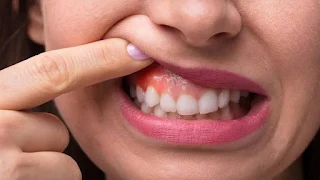First it spreads, then it collapses the whole body: It leads to death.
Millions of people around the world die from heart disease. So how do we protect our hearts? Have you ever thought? The first thing to do to prevent heart ailments is to create a diet. However, it has an important place in hygiene as well as nutrition. The first symptoms of these diseases begin in the mouth. If you have such mouth sores, get checked immediately.
Heart disease is one of the biggest causes of death. Experts have discovered that those who do not pay attention to their oral health and hygiene have a greater risk for heart disease. If you want to be protected from these diseases, you need to pay attention to both hygiene and the foods you consume. However, if you have such benefits in your mouth, get checked immediately! It may be the first sign of the disease. It can lead to death...
CAUSES MILLIONS OF PEOPLE DEATH
Millions of people die every day due to heart disease. When we look at examples, one person dies from cardiovascular disease every 36 seconds in the USA. So how do we protect ourselves from this disease? Here are the main things you can do to avoid heart disease:
Healthy eating
150 minutes of exercise per week
Avoiding alcohol and smoking
YOU ARE AT RISK IF YOU ARE IN THIS GROUP OF DISEASE
People with periodontitis are at higher risk for stroke, heart attack, and other cardiovascular diseases, according to a study published in the Journal of Periodontology and led by Forsyth Institute and Harvard University scientists.
WHAT IS PERIODONTITIS?
Periodontitis, also called gum recession or gum disease, is a serious gum infection that damages the soft tissue around the teeth and, if left untreated, can destroy the bone that supports an individual's teeth. Gum recession (periodontitis) can cause loosening or loss of teeth.
Gum recession (periodontitis) is a common but largely preventable condition. It is usually caused by poor oral hygiene and care. Brushing teeth at least twice a day, flossing daily, and having regular dental examinations can both reduce the likelihood of developing gingival recession (periodontitis) and greatly increase the chances of successful treatment.
WHY DOES THE GI tract recede?
In many cases, the development of gingival recession (periodontitis) begins with the formation of plaque, a sticky film made up of bacteria at its base. If this plaque is left untreated, it can eventually turn into periodontitis.
Plaque forms on the teeth when starches and sugars in food interact with bacteria normally found in an individual's mouth. Brushing twice a day and flossing once a day can remove plaque buildup, but plaque builds up quickly.
Plaque remaining on the teeth can harden below the gum line and become tartar, that is, tartar. Tartar is more difficult to remove than plaque and is full of bacteria. The longer plaque and tartar remain on your teeth, the more damage it can do. It is not possible to clean calculus by brushing and flossing. A professional dental cleaning is needed to remove it.
DO GUM DISEASES CAUSE HEART DISEASE?
Interventional cardiologist Dr. Rahul Aggarwal describes the link between gum and heart disease in these words:
"Researchers have been studying this for at least 20 years. We certainly see a correlation between gum disease and a heart attack, but there's no clear way around it. Causation is not seen. Diseases that damage blood vessels, such as periodontitis, can also damage the heart.
If a person is unable to get good blood flow to their gums, they are more likely to have gum disease and may do whatever triggered it. It is the same for one's heart. There may be a systemic problem in the person. This is a reflection of the overall health of the individual. Inflammation also plays a role and seems to increase the onset of heart disease."






0 komentar:
Post a Comment